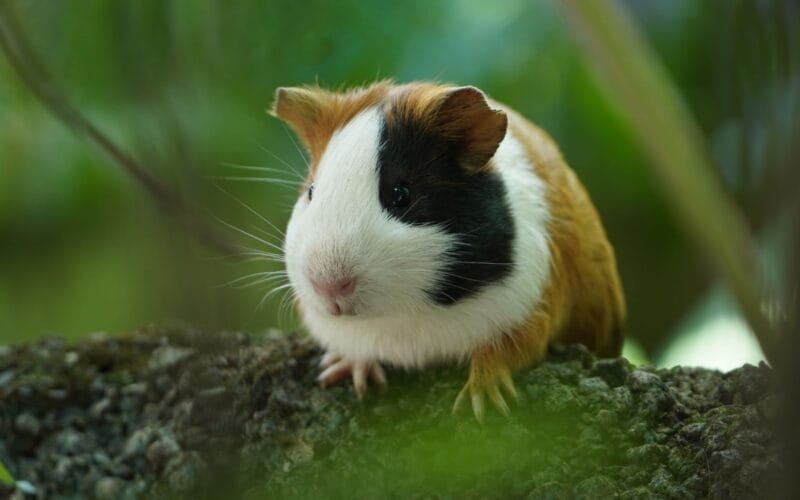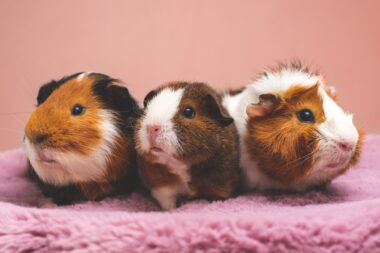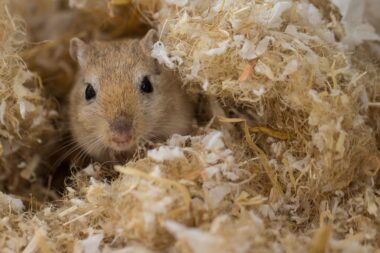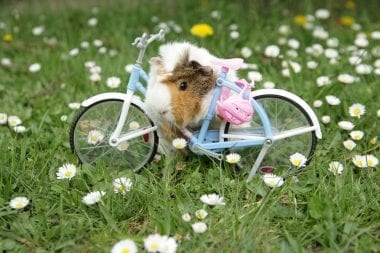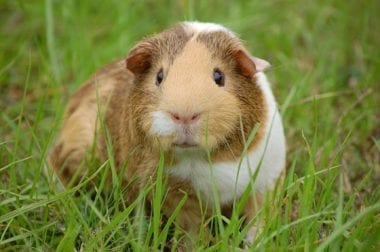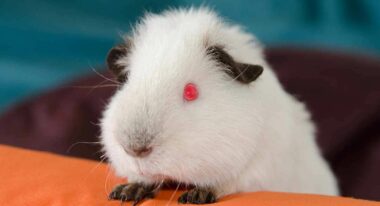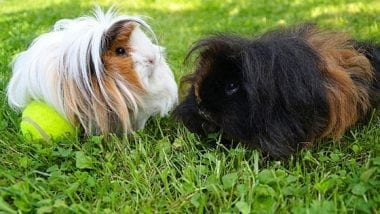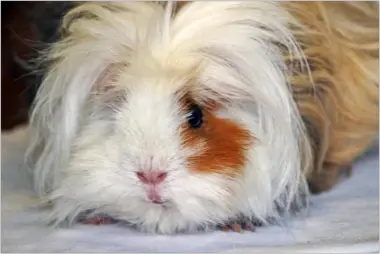For many pet owners, their pets are a source of ultimate joy. It’s only natural that pet parents want to ensure their fur baby lives a comfortable, happy, and healthy life. When it comes to small pets like guinea pigs, knowing something about the guinea pig life span is important.
What are guinea pigs?
These furry creatures are a part of the rodent family. They originated from South America, where they were domesticated from a similar species. Sometimes known as the cavy, guinea pigs are popular household pets. They can measure up to twenty-five centimeters in length and weigh up to 1200 grams. Guinea pigs are happiest when they live in groups.
Cavies have a gentle personality. They are curious, social, and perfect for first-time pet owners.
What is the guinea pig life span?
When you compare them to other small pets, guinea pigs live a lot longer. The average life span is between four and ten years. Although in a rare occurrence, the longest living guinea pig lived for fifteen years.
Like any other pet, its longevity will depend on factors like how happy and healthy the guinea pig is. Offering your guinea pig nutritious food and proper attention will increase both the quantity and quality of its life.
Variables like infections, poor nutrition, ring worms, heat stroke, and parasites can lead to premature death in guinea pigs. Similar to human beings, an individual guinea pig life span will depend partly on its environment and partly on genetics. While a guinea pig might have innate health issues that can limit its life span, there are steps you can take to ensure it lives the happiest and longest life ever.
8 Ways to Maximize a Guinea Pig’s Life Span
Keep reading to learn about six simple ways to increase the quality of your pet guinea pig’s life.
1. Offer proper nutrition.
As a pet parent, you are responsible for your guinea pig pet’s health and well-being. It is your responsibility to ensure that your guinea pig gets adequate nutrients to help it lead a healthy life. Good nutrition is the first and important step to increase your pet’s life span.
Offer your pet high quality grass hay, pellets, vegetables, and fruits. Their diet should contain all the essential vitamins and minerals such as:
- Phosphorous
- Calcium
- Potassium
- Magnesium
- Vitamins A. D, C, and E
Some examples of fresh foods that you can feed your guinea pig are carrots, apples, celery, and leafy greens. Fruits are vital to a guinea pig’s health as well, but due to their high sugar content, keep them at a minimum. Too much sugar can destroy your pet’s teeth.
In addition to good food, your pet needs fresh water. Change your guinea pig’s water at regular intervals. Fresh food and water are the cornerstones of increasing guinea pig life span.
2. Regularly clean the cage.
You must clean your pet guinea’s cage on a regular basis. Make it a habit to remove fecal matter at least twice a day. Although their fecal matter is small a guinea pig has bowel movements throughout the day. The frequency will increase once your pet reaches the adult stage.
In addition, perform a deep clean of the cage every three to four days. This involves removing the dry hay, fecal matter, bedding, drinking apparatus, food bowl, etc. During the cleaning phase, keep your guinea pig in a secure and safe place. Thoroughly clean the cage with soap and water. Dry it well before filling it up with fresh bedding and hay. Be sure to rinse out and refill the water bottle and food bowl as well.
What will happen if you neglect regular cage cleaning? It leaves them vulnerable to acquiring bacterial and viral infections which can reduce the guinea pig life span. Bumblefoot is a common infection that occurs in guinea pigs. It is an inflammatory condition that affects your pet’s feet. It only happens when the cage remains uncleaned for long periods of time. Since rodents are messy beings, they will unwillingly jump into their own urine and fecal matter and then cozy into their bedding. This is why regular spot cleaning and deep cleaning are vital in maintaining good hygiene.
3. Maintain good hygiene.
Your fur baby loves running around in its feces and urine, so you can expect it to start smelling very soon. This is why it’s necessary to bathe your pet guinea pig every three months.
Will your pet love it or hate it? The answer depends on your guinea pig’s personality. In either case, to bathe your pet, you will need the following items:
- Rabbit or guinea pig shampoo (human shampoo will not do)
- Towel
- Hair dryer
- Animal hair brush
Start by filling up the sink with lukewarm water. Gently cradle your pet in your palm and let the warm water flow over its body. Keep the water flow gentle. Avoid putting the water into its eyes, ears, and face. Once its body is wet, pour a bit of shampoo onto its body and start lathering it into the fur. Gently rinse off the lather. Then wrap your fur baby in the towel. Ensure most of the water is absorbed. Take the dryer and keep it on a low heat setting. Brush your pet’s hair and dry it at the same time. If you’re uncomfortable with bathing your pet, use a warm washcloth instead.
4. Pay attention to the teeth and nails.
Another important to increase the guinea pig life span is taking good care of its teeth and nails. Your fur baby’s teeth and nails are growing all the time. Offering your pet good quality hay will help it grind down its teeth. Keep checking your pet’s teeth every day. They should be even.
To care for a guinea pig’s nails, opt for a nail trim every two to four weeks. This depends on how quickly they grow. Regular nail clipping is important to keep nail infections at bay. If you’re uncomfortable with cutting your pet’s nails, make an appointment to see a small animal veterinarian.
5. Raise them with friends.
Guinea pigs are social creatures. They love to live with other guinea pigs. One companion is enough, but the more the merrier. To ensure your guinea pig is mentally and emotionally happy, raise another guinea pig (of the same sex) together. If you prefer to keep one from both genders, ensure either of them is neutered or spayed. This will prevent unwanted pregnancies. When guinea pigs are raised in pairs, it encourages regular pay, exercise, and social interaction. It prevents obesity and promotes blood circulation.
6. Provide sufficient living space.
Guinea pigs need lots of space to thrive. If you’re planning to raise two guinea pigs, prepare at least ten square feet of space. Space enables them to establish their own territories and engage in lots of exercise.
It is important for guinea pigs to get enough exercise. Unlike their hamster cousins who run on the wheel, guinea pigs like to run around. Without sufficient exercise, they will become overweight and experience excessive gas and bloating.
It is vital for pet owners to ensure there is lots of space. This discourages guinea pigs from hurting and fighting with each other.
7. Prevent sudden temperature fluctuations.
The guinea pig temperament is very delicate. They do not fare well to sudden changes in temperature. As a result, they are vulnerable to sun and heat strokes. Avoid placing your pet’s cage in direct sunlight. A place that offers indirect sunlight is best. In addition, ensure there is no draft where the cage is placed. This prevents respiratory infections and prolongs the guinea pig life span.
Place the cage on a stable surface where the heat and humidity levels are low. Never place your pet’s cage in the bathroom or laundry room. Keep their cage indoors at all times.
8. Look for a small animal veterinarian.
Like other small pets, guinea pigs are prone to injuries and illness. A standard veterinarian will not have specialized knowledge about caring for guinea pigs. It will be helpful to find a small animal vet BEFORE bringing your fur baby home. A veterinarian is necessary to meet pet emergencies and regular checkups.
Another way to increase the guinea pig life span is going for regular veterinarian appointments.It is difficult to determine whether your guinea pig is sick or not until you see certain symptoms. This is why it’s necessary to visit a vet on a regular basis. The vet will be able to catch the problems early. There are some vets who are experienced in caring for guinea pigs and other small rodents.
Most people don’t think it’s necessary, but doing so will ensure your guinea pig is healthy. In addition, a vet can offer helpful tips about guinea pig care, nutrition, and exercise.
Conclusion
Guinea pigs can live from four to ten years. The quality and guinea pig life span longevity will depend on many factors like hygiene, care, nutrition, space, social opportunities, stable temperatures, and regular vet visits.
